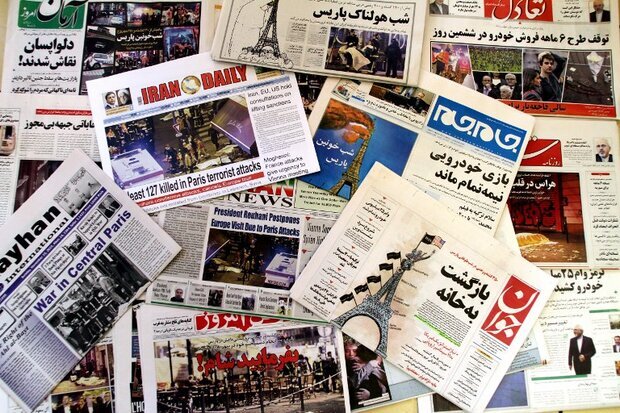Macron's political penitence

In a note, Javan addressed the phone call between Macron and Raisi. It wrote: Fools never think the penalty of their stupidity and they are never punished as much as their stupidity.
A few months ago, they assumed everything was over, otherwise the principles of international relations would not have allowed them to take photo with the official saboteurs of the country where they have ambassadors and high-level relations. But it seemed to them that the work is over and people accept their invitations to launch strikes and overthrow the establishment. Why should those photos be underestimated?! Why should one think that those photos were pointless and aimless?! They had done these things in different parts of the world and had experience. They predicted like experts and calculated like mathematicians! Experience had given them confidence. But they did not understand the fault of their work in the "special case of Iran".
Now, after one hour and a half, they read their repentance letter before a priest to confess their sins and talk about "interaction"! This can be called nothing except "political penitence of the fools"!
Ham Mihan: Controlling Iran instead of reviving JCPOA
In a commentary, Ham Mihan discussed the report by Axios about the indirect negotiations between Iran and the United States in Oman and said: In the news published by Axios, there is no mention of the JCPOA negotiations. Also, Brett McGurk (the White House Middle East coordinator) doesn't seem to be at the level to enter into nuclear negotiations. It is clear that the nuclear negotiations in the Biden administration are entrusted to Robert Malley. For this reason, the absence of Malley in Oman and the presence of Brett McGurk in Muscat, and his indirect conversation with Ali Bagheri can indicate the decision of America to convey the message directly to Iran. But can't America convey this message to Iran through intermediaries? The answer could be that sometimes countries may cut out intermediaries in order to convey important messages to have a decisive effect. The agenda that Axios has discussed about this alleged negotiation is also interesting. The three issues of America's warning to Iran regarding 90% enrichment, Iran's regional behavior, and Iran's role in the war in Ukraine are among the topics of this negotiation. Therefore, it seems that non-JCPOA issues were considered by the U.S. and there is a possibility that the U.S. intends to pursue the project of controlling Iran under the name of "reducing tension" by using the channel of secret negotiations.
Hamshahri: Why interim agreement?
In an analysis, Hamshahri analyzed the goals of the United States to pursue “interim agreement” with Iran. The paper said: Another reason behind the issue of interim agreement in the current situation is the desire of the Western governments to leave the sanctions case open against Tehran. The sanctions approach of the European Union and the United States, which has been continuing in recent months, is considered as an anti-Iran tool in their hands, and a good agreement will deprive them of possible use of this pressure lever. Therefore, Western governments, especially the United States, are trying to keep this anti-Iran tool in their hands by promoting the idea of an interim agreement or even a "step-by-step return" and not canceling a significant part of the sanctions; this is while the Iranian side has always emphasized that it will only agree to an agreement that includes the cancellation of all sanctions and the exposure of effective executive guarantees.
Sobh-e-No: The necessity of redefining Iran's role in international economy
In its editorial, Sobh-e-No discussed the importance of transit routes for Iran. It wrote China, which is seeking to complete the Silk Road, knows that Iran is the irreplaceable route due to the tensions in the Caucasus and the war in Ukraine. By choosing Iran, China can win the trust of Tehran for huge investments in this project. Considering Iran's convenient geographical location, it is very necessary to use the country's transit capacities as one of the sources of income generation, because Iran can play a prominent role in the exchange of goods between countries on the route. Our country is located at the transit intersection of the world and the use of this capacity requires the attention of the authorities, which unfortunately has been neglected and even some had adopted policies to deprive the country from such a golden opportunity. Given the sanctions imposed by the United States on Iran's economy and that they will not be removed easily, it is necessary to redefine Iran's role in the international economy.
Leave a Comment